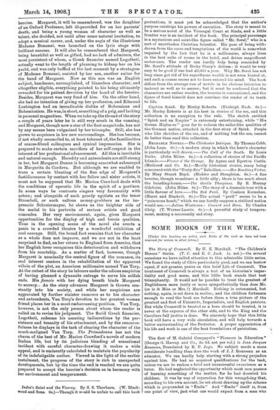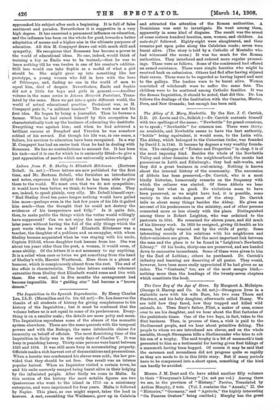The first of M. Gabriel Compare's " Pioneers in Education"
(George G. Harrap and Co., 2s. 6d. net per vol.) is Jean Jacques Rousseau, Translated by R. P. Jago. No subject needs a more considerate handling than does the work of J. J. Rousseau as an educator. We can hardly help starting with a strong prejudice against him. He had no acquired qualifications for" the tisk, unless we are to reckon a brief and unsuccessful experience, as a tutor. He had neglected the opportunity which most men posiess of learning something of the matter, for he had deserted ' his children. It was by way of reparation for this wrongdoing that, according to his own account, he set about drawing up the scheme which is propounded in "Emile." And " Emile " itself is, from one point of view, just what one would expect from a man who approached his subject after such a beginning. It is full of false sentiment and paradox. Nevertheless it is suggestive in a very high degree. It has exercised a permanent influence on education, and the influence has been on the whole for good, towards a better adaptation of means and a higher aim in the ultimate purposes of education. All this M. Compayre draws out with much skill and sympathy. He recognises that Rousseau has become a power in the world of educational ideas. No one, indeed, would think of training a boy as ];mile was to be trained,—that he was to learn nothing till he was twelve is one of his creator's oddities. Still less would one take Sophie as a model of what a girl i should be. She might grow up into something like her prototype, a young woman who fell in love with the hero of Taemaque, and, finding no one in the world of men to equal him, died of despair. Nevertheless, mile and Sophie did not a little for boys and girls in general.—Another volume in the same series is Johann Heinrich Pestalozzi, Trans- lated by the same. Here we get into a quite different world, the world of actual educational practice. Pestalozzi was, as M. Compayre puts it, "a militant teacher." The work was not his first idea. He began by being a journalist. Then he became a farmer. When he had ruined himself by this occupation he characteristically took up the business of.educating the destitute. Everything was against him; and when he had achieved a brilliant success at Burgdorf and Yverdon he was somehow robbed of his reward. But though his life was, in one sense, a failure, his services to education have been recognised. In a way M. Compayre has had an easier task than he had in dealing with Rousseau. He has no contradictions to account for. It has been his task—and it is one for which he is eminently fitted—to give a just appreciation of merits which are universally acknowledged.











































 Previous page
Previous page